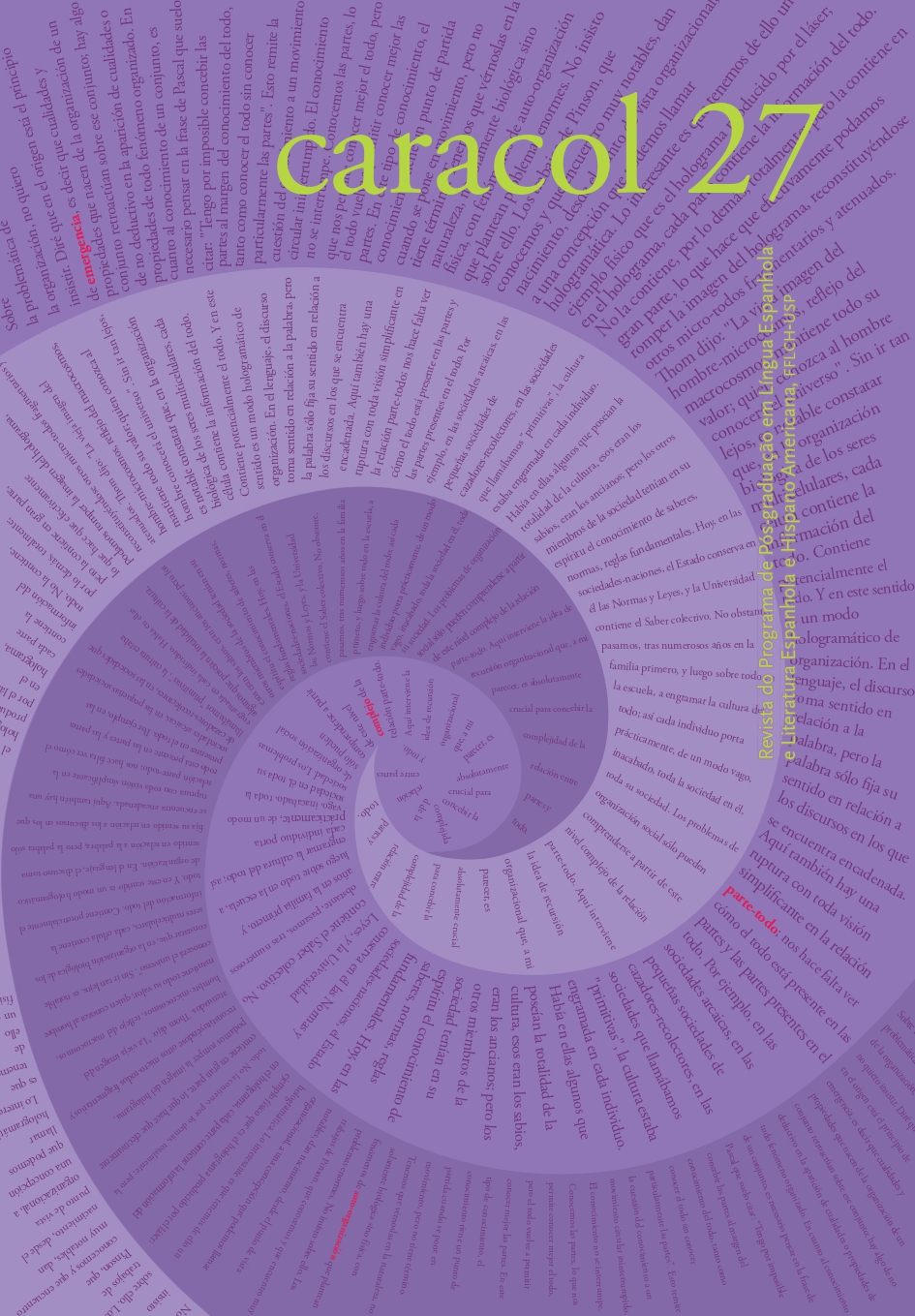Bakongo cosmogram and brujo-chamanismo as critical alternatives to a eurocentrated modernity in Latin America
DOI:
https://doi.org/10.11606/issn.2317-9651.i27p99-131Keywords:
Cosmogony of Original Peoples , African Cosmogony , Latin American Cultural Studies, Hispano-American Literature , Literary Criticism.Abstract
by presenting how the original and African cosmogonies and cosmovisions operate and are systematized on the American continent, it is intended to have sensibilities capable of articulating ancestral thought as a critical alternative to Eurocentric Modernity. From the concept cristarronaje (Mendes, 2019) brujo-chamaniusmo (Busso, 2011) the study presents the idea of ancestral resistance as axes that underlie critical thinking from the redefinition between humanity and nature at the same time that it would establish genuine theoretical frameworks and criticality organic in accord with historical experience. The objective would be to promote impulses for the development of critical (ethical) and creative (aesthetic) projects based on the relevance of indigenous peoples and Afro-descendants in the formation process of Latin American societies. It is expected, with this, to contribute to adjustments and advances of a Historiography and Latin American Literary Criticism committed to the fundamentals of its historical representativeness and Education.
Downloads
References
Busso, Hugo. Hay que ir más allá del paradigma moderno. Café Latino, Tarragona, 10 jul. 2012. Disponível em: https://www.ecoticias.com/sostenibilidad/68081/Hugo-Busso-alla-paradigma-moderno. Acesso em: 10 jul. 2017.
Busso, Hugo. Crítica a la Modernidad Eurocentrada. Em Búsqueda de Múltiples Alternativas Decoloniales. Madrid: Editorial Académica Española, 2011.
Cabrera, Lydia. El Monte. La Habana: Editorial Letras Cubanas, 1993.
Carné, Karla Marina Lopes Martinez. El Nahualismo en la Narrativa Oral del Municipio de Nahuizalco. Trabalho monográfico para obtenção ao grau de Licenciada em Letras. Universidad de El Salvador. San Salvador, 2016.
Carpentir, Alejo. Os Passos Perdidos. Trad. Marcelo Tápia. São Paulo: Martins Fontes, 2008.
CASTRO-GÓMEZ, Santiago. Hybris del Punto Cero: Ciencia, Raza y Ilustración em Nueva Granada (1750-1816). Bogotá: Editorial Pontificia Universidad Javeriana, 2013.
Descola, Phillipe. Par-delà Nature et Culture. Paris: Gallimard, 2005.
Domingos, Luis Tomas. “A Visão Africana em Relação à Natureza”. ENCONTRO NACIONAL DO GT HISTORIA DAS RELIGIÕES E DAS RELIGIOSIDADES – ANPUH – Questões Teórico-metodológicas no Estudo das Religiões e Religiosidades, 3.. Anais... In: Revista Brasileira de História das Religiões, v, III, n.9, Maringá: jan. 2011. ISSN 1983-2859. Disponível em: http://www.dhi.uem.br/gtreligiao/html. Acesso em 23 de setembro de 2018.
DUNCAN, Quince. “El Afrorrealismo: Una Nueva Dimensión de la Literatura Latinoamericana”. Habana: La Jiribilla, 2006. Disponível em: http://www.lajiribilla.cu/2006/n272_07/272_06.html Acesso em: 6 out. 2014.
Fu-Kiau, Kimbwandende Kia Bunseki. “A Visão Bântu Kôngo da Sacralidade do Mundo Natural”. Tradução para uso didático de PINTO, Valdina O. Salvador, mar. 1998. ASSOCIAÇÃO CULTURAL DE PRESERVAÇÃO DO PATRIMONIO BANTU – ABANTU – COMUNIDADES ORGANIZADAS DA DIÁSPORA AFRICANA – Rede KÔDYA. Salvador: 2018. Disponível em: https://estahorareall.files.wordpress.com/2015/07/dr-bunseki-fu-kiau-a-visc3a3o-bantu-kongo-da-sacralidade-do-mundo-natural.pdf Acesso em: 28 mar 2018.
GOMES, Flavio dos Santos. Mocambos e Quilombos. Uma História do Campesinato Negro no Brasil. São Paulo: Claro Enigma, 2015.
Gonzalez, Roberto Martiínez. “La Animalidad Compartida”. In: Revista Espanhola de Antropología Americana, Madri, 2010, v. 40, n. 2, p. 256-263, ISSN: 0556-6533.
Ilonbe, Raquel. Ceiba. Madrid: D. L.,1978.
LEFF, Enrique. Racionalidade Ambiental: A Reapropriação Social da Natureza. Trad. Luis Carlos Cabral. Rio de Janeiro: Civilização Brasileira, 2006.
Llosa, Mario Vargas. El Hablador. Lima: Editorial, 2008.
Mendes, Rogerio. Pedagogia da Cimarronaje. A Contribuição das Cosmogonias e Cosmovisões Africanas e Afrodescendentes para a Crítica Literária e Literaturas (Afro-) Latino-Americanas. Tese de Doutorado. PPGL/UFPE, Recife: 2019.
Oliveira, Eduardo David. Filosofia da Ancestralidade: Corpo de Mito na Filosofia da Educação Brasileira. Curitiba: Editora Gráfica Popular, 2007.
Oliveira, Eduardo David. Filosofia do Encantamento. En: Revista Trans, 7, 2003,, 5-7.
Palomo, Benjamín. Hablan los Nahuales. Mito y Testimonio. São Salvador: UCA, 1998.
PORTO-GONÇALVES, Carlos Walter. Abya Yala. In: SADER, Emir. Latino-Americana. Enciclopédia Contemporânea da América Latina. São Paulo: Boitempo, 2006. Disponível em: http://latinoamericana.wiki.br/verbetes/a/abya-yala Acessado em: 5 de maio de 2017.
Postioma, Adalberto. Filosofia Africana. Luanda: Seminário de Luanda, 1968.
Queiroz, Amarino Oliveira de. As Inscrituras do Verbo. Dizibilidades Performáticas da Palavra Poética Africana. Tese de Doutorado. PPGL/UFPE, Recife: 2007.
Spirito Santo, Augusto. “Menos Foucault e Mais Fu-Kial:” Filosofia Bacongo para Iniciantes. Rio de Janeiro: mar. 2011. Disponível em: https://spiritosanto.wordpress.com/2017/06/06/menos-foucault-mais-fu-kiau-filosofia-bakongo-para-iniciantes/ Acesso em: 28 mar. 2019.
Downloads
Published
Issue
Section
License
Copyright (c) 2024 Rogerio Mendes

This work is licensed under a Creative Commons Attribution 4.0 International License.
Authors who publish in this journal agree to the following terms:
- Authors retain copyright and grant the journal the right of first publication, with the work simultaneously licensed under a Creative Commons Attribution License, which permits the dissemination of the work with recognition of authorship and initial publication in this journal.
- Authors are allowed to enter into additional contracts separately for non-exclusive use of the version of the work published in this journal (such as publication in an institutional repository or as a book chapter), with recognition of authorship and initial publication in this journal.
- Authors are allowed and encouraged to publish and distribute their work online (e.g., in institutional repositories or on their personal page) at any point before or during the editorial process, as this can generate productive changes, as well as increasing the impact and citation of the published work (see The effect of open access…).




